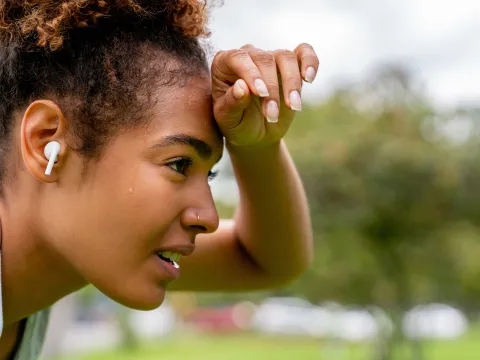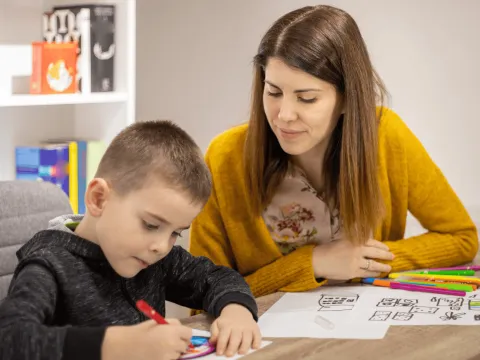- AdventHealth

Choose the health content that’s right for you, and get it delivered right in your inbox.
Simone Biles, the most decorated gymnast in history, is globally celebrated as a powerful American woman — and not just for her superhuman athletic abilities that seem to defy the laws of physics. Biles, 27, is also an empowering icon for mental health awareness and destigmatizing mental illness. She famously chose to withdraw from the games as a high-profile competitor in 2021, citing the reason as “mental health concerns” at the time.
Biles knew when to say "No" on behalf of her whole-person health, stating, "My body and my mind said, 'No, Simone, you need to take a break.' Thankfully, I listened. I know in my heart it was the right decision [. . .]. I didn't quit. My mind and body are simply not in sync [. . .]. Physical health is mental health." Her powerful words remind us that our bodies and minds are intrinsically connected; when one is suffering, the other is too.
Coming Back Stronger After a Break
This year, Simone Biles and her 2024 all-star team came back stronger than ever, adding even more gold to her growing collection. Her mental health break gave her the space and healing she needed to say “Yes” at the appropriate time. As a result, she returned refreshed and strengthened for success — in body, mind and spirit.
Keep reading to learn more about the power to say “No” for your mental health, and how doing so can help you reclaim autonomy and set you up for victory.
The Power to Say “No”
Saying “No” can feel intimidating, especially if being a “yes person” is an unspoken expectation in your circle. But there is great power in knowing when to say no. Many mental health professionals agree that a strategic “No” when you’ve had enough fosters improved mental health and can lead to your next big "Yes" — and even more success — when you've given yourself enough space to reorganize, recuperate and heal from mental burnout, physical strain or both.
Here are some of the reasons mental health professionals cite for the benefits of knowing when to say "No" when it’s in your best interest:
Knowing You Have the Choice
“Choice” is the first word in AdventHealth’s CREATION Life acronym for a reason: Making healthy choices is the foundation for living a whole life. And having choices is associated with a sense of control, which is connected to survival. While we'll never be able to control everything, knowing you have choices that can influence outcomes that are within your control has proven health benefits.
Research shows that not having a choice in a matter leads to feelings of helplessness and can have a detrimental impact on our mental health, bringing on or exacerbating symptoms of depression, anxiety and other serious conditions. Even the feeling of not having a choice can have the same impact, so it’s important to remember that you do get to choose. Whether it’s a “Yes” or a “No,” the choice belongs to you.
A Sense of Autonomy
It’s important to feel we have autonomy, or freedom over our own lives, to make those all-important choices. In a famous study by Langer and Rodin (1977), nursing-home residents were given many choices about their daily meals, activities, schedules and more; they were also responsible for caring for a plant they were given. Thanks to that sense of purpose, compared to a control-condition floor where residents were given no choices (nor a plant), the residents with choices and purpose reported increased happiness and activity levels, and their nurses’ judgment of improvement increased three weeks into the study; at 18 months, the nurses’ ratings of their activity levels and doctors’ ratings of their overall health improved. Interestingly, their mortality rate decreased by half — from 30% to 15% — compared to the control floor.
That said, a sense of autonomy is not only an empowering mental health enhancer; research shows it can even extend longevity. Saying “Yes” or “No” to what works for you is key to having autonomy. Remember, this is your life. You get to author it.
Healthy Boundaries
In psychology, boundaries are limits we set for ourselves and others to protect our whole health. Setting boundaries around what we dedicate our time and energy to allows us to organize our lives in ways that help us function at our best. Whether it’s a healthier work/life balance, maintaining wholesome relationships and minimizing contact with hurtful people, or making more time for family and self-care, setting boundaries makes achieving those goals within reach.
On the other hand, not setting appropriate boundaries can lead to unhealthy patterns of people pleasing, taking on more than we can manage, being or feeling taken for granted, physical and emotional exhaustion (or burnout) and heightened anxiety.
Knowing when to say no is part of having healthy boundaries, which can reduce stress, improve your time management, enhance relationships, increase confidence and give you a sense of control over your life.
Space to Heal
Sometimes, making space means letting go. Making time for rest revives the body, reduces stress and restores the spirit. “Rest,” the second word in the CREATION Life acronym, means more than getting proper sleep. While true rest includes rejuvenating sleep, it also means unplugging and saying “No" when necessary. That leaves room to say “Yes” to whatever supports your well-being.
Self-Care
Self-care is more than a trend. It’s vital for to our well-being to care for ourselves as much as we care for others. Ways to make space to heal and provide self-care include creating your own sanctuary in your home or office that induces a sense of peace, making time for relaxing activities you enjoy, adding healthy foods to your diet and creating time for friends, family or just for you. Having enough alone time is just as important as nurturing healthy relationships with the special people in your life so you can show up as your best self — every time.
Creative Ways to Say “No”
While a simple "No, thank you" goes a long way when declining an invitation or added chore that exceeds your limit, here are a few pro tips you can try:
- I don't have time right now
- Thank you for asking, but I'm unable to do that
- I'd love to, but other commitments need my attention
- No, thank you
- I'm uninterested
- I'm busy that day
- Let's plan for another time
- I'm going to do something else that day
- My schedule doesn’t allow for it
- I’m not feeling well
- No
Notice that these statements don’t include apologies. Never feel the need to apologize for prioritizing your well-being.
Say “Yes” to Whole-Person Support for Body, Mind and Spirit
At AdventHealth, we strive to care for the whole person, which means keeping you well physically, mentally and spiritually. Knowing when to say no and giving yourself extra space to heal is essential for your well-being. Take inspiration from Simone Biles, who continuously proves that we can come back even better after a much-needed and well-deserved mental health break.
If you’re struggling, reach out to our compassionate AdventHealth behavioral health specialists for a personalized treatment plan and expert care that sees the whole you. You deserve to feel whole — in body, mind and spirit.


